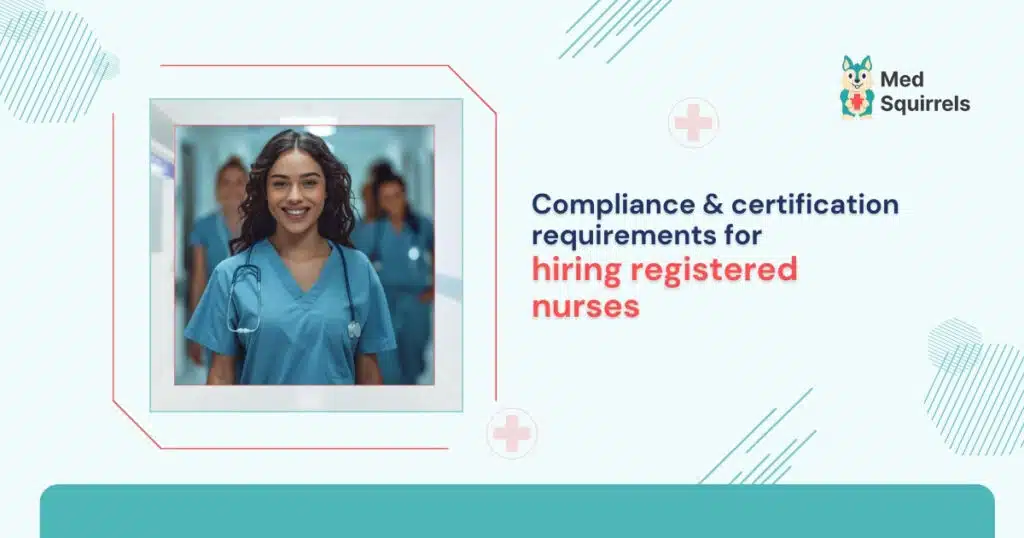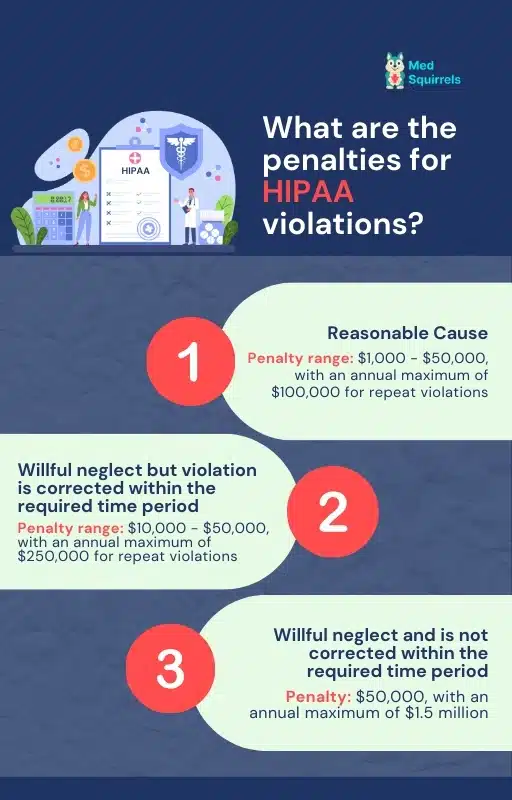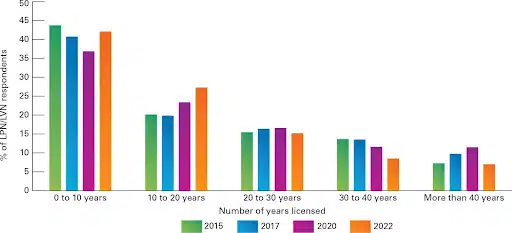Compliance and certification requirements for hiring registered nurses

While hiring registered nurses, proper measures must be taken to navigate the compliance and rn certification requirements imposed by the states. There are various ways to hire registered nurses, including full-time and contract.
Each has its own regulatory guidelines and compliance policies set by the state, which must be followed throughout the recruitment process to maintain registered nurse hiring compliance.
In addition, facilities must stay aware of evolving regulatory expectations to keep their processes current. By doing so, recruiters can also meet the broader RN compliance requirements expected across healthcare systems.
The legal requirements for practicing as a registered nurse in the USA include obtaining a state-specific license and meeting the required qualifications. The minimum qualification requirement for nurses consists of a bachelor’s degree in nursing, an associate’s degree in nursing, or a diploma from a university accredited by the board.
Even though this legal requirement verification seems simple, other state regulatory guidelines and policies, as well as the RN’s primary responsibilities, complicate the RN hiring process.
Healthcare facilities must also consider legal factors when hiring a nurse to avoid noncompliance risks and maintain safe, accountable staffing practices.
Understanding the legal challenges of RN hiring and staying up to date on current regulatory guidelines is key to staffing your facility with the providers you desire.
This blog delves into the hiring compliance and nursing certification requirements for RN staffing, and how to streamline them while ensuring registered nurse hiring compliance throughout the process.
Legal and compliance challenges healthcare facilities face when they hire RNs
The following are key challenges and solutions to consider when hiring registered nurses for your healthcare facility. Many of these steps require careful coordination between HR, clinical leadership, and credentialing teams to avoid delays in onboarding. A structured approach also ensures your facility remains audit-ready and aligned with evolving regulatory expectations.
Challenge: Confirm that the candidate has a valid work license in the state where your facility is located.
Solution: The NCLEX (National Council Licensure Examination) for RNs is the licensure examination for nurses in the USA that assesses a nurse’s competency to work as a registered nurse. The state board of nursing can verify the validity of the licensure.
Most boards offer online tools that let you enter the license number to check its status. You can also look up and verify a license through Nursys, the national nurse licensure database used by most state boards, in addition to your state’s verification board, to ensure legal compliance during staffing.
Challenge: Conducting a thorough background check for any criminal, drug abuse, or sexual harassment history.
Solution: There are reputable medical staffing solutions providers in the USA that can handle the entire RN credentialing process.
Challenge: Adhering to the equal employment opportunity law (EEO) to restrict any bias based on gender, age, race, disability, etc.
Solution: When you hire registered nurses, a structured interview process that evaluates all candidates against a common benchmark can help ensure compliance with equal employment opportunity laws.
In addition, documenting every step of the recruitment process can help you avoid compliance issues in healthcare and support essential legal considerations when you hire a nurse.
Challenge: Following federal and state labor laws regarding employment and workplace policies.
Solution: Staying updated on the changing norms and labor laws of the state can help ensure timely review of staffing policies and strengthen your RN compliance requirements approach.
Challenge: Complying with Occupational Safety and Health Administration (OSHA) regulations to secure workplace safety standards
Solution: Proper training on safety standards must be provided during onboarding. Make this training mandatory so that even experienced candidates are aligned with current protocols. Regular safety audits should also be conducted to ensure legal compliance with RN staffing.
Challenge: Ensuring compliance with the Health Insurance Portability and Accountability Act (HIPAA), which protects patient data privacy
Solution: Execute strict policies for handling and sharing patient information, and educate all staff on best practices for data confidentiality as part of registered nurse hiring compliance.
Bonus tip: To ensure continuing education qualification, provide ongoing training to your existing registered nurse staff and support them in taking certifications.
Potential legal implications of hiring unlicensed or uncertified nurses
Given the criticality of the healthcare industry, facilities can face serious consequences if they hire unlicensed or uncertified nurses. Legal considerations for hiring a nurse must be followed, as unlicensed nurses can misdiagnose patient symptoms, violate infection control measures, fail to meet safety standards, or cause medical errors that harm patients.
Severe regulatory penalties will be imposed on healthcare facilities that fail to ensure legal compliance. Moreover, if any patient harm is caused, a lawsuit may be filed, and the facility will be held liable for negligence. Based on severity, healthcare facilities may lose their accreditation. Consequently, this can damage the facility’s reputation and result in a loss of patient trust.
Reputation damage can affect the facility’s employer brand, resulting in a shortage of skilled candidates willing to work there. A history of non-compliance can also increase liability insurance premiums due to heightened facility risk.
When HIPAA regulations are compromised, the facility will be fined depending on the severity of the data privacy violation. The American Medical Association clearly states that HIPAA violations are enforced and stipulates penalties for civil violations that range from $100 for unknowingly violating the HIPAA guidelines to $50,000 per reasonable violation, based on the severity. A detailed infographic has been added to explain how HIPAA breaches result in penalties based on the severity of the privacy violation.

U.S. Department of Health and Human Services (HHS) Office for Civil Rights (OCR) enforces the HIPAA Privacy and Security Rules.
Failure to comply with HIPAA can also result in civil and criminal penalties. If a complaint describes an action that could violate the criminal provision of HIPAA, OCR may refer the complaint to the Department of Justice (DOJ) for investigation.
Source:American Medical Association
License renewal requirements for registered nurses in Texas
The Texas Board of Nursing permits the license renewal of registered nurses on a case-by-case basis. Registered nurses practicing in Texas must renew their license every two years, beginning 60 days prior to the license expiry date.
The renewal procedure includes submitting an application, a $68 fee, and proof of completion of at least 20 hours of continuing nursing education (CNE) from an authorized provider.
Once submitted, the board validates the credentials and approves renewal within 15 working days. The verification process supports rn certification requirements for nurses practicing in the state.
Nurses with multistate licensure from other states can work in Texas; however, renewal guidelines differ. According to the 2022 National Nursing Workforce Survey, RN respondents showed shifts in licensure trends, indicating evolving renewal and credentialing patterns across the country. A detailed infographic has been added to help you quickly understand the shift toward a younger RN workforce and the decline in nurses with more than 20 years of experience.
Number of years licensed

Source: Journal of Nursing Regulation
How HR teams can streamline the certification verification process
Certificate verification is a necessary step in the pre-recruitment stage of RN hiring. It helps confirm candidate competency and ensures the qualifications come from accredited institutions as defined by state requirements. Strengthening this process supports Registered nurse hiring compliance by reducing credential-related risks for facilities.
Additionally, maintaining a clear, consistent verification workflow helps facilities stay aligned with broader RN compliance requirements across different states.
Here are some quick suggestions to streamline the verification process:
- Keep a certification verification checklist handy.
- Train HR staff thoroughly on the process.
- Leverage technology to detect data mismatches as part of the RN credentialing process.
- Maintain digital, cloud-based documentation for easy access.
- Conduct comprehensive background verifications.
- Ask for references to validate experience.
- Collaborate with medical staffing platforms that can manage the full RN credentialing process.
How can facilities craft effective job descriptions?
When you hire registered nurses, a well-written job description helps attract top talent and ensure quality hires. Craft job descriptions by clearly outlining job duties, workplace expectations, and ideal candidate criteria. The RN’s responsibilities include coordinating patient care, assessing vital signs, administering medications, educating patients and families, and providing emotional support.
Briefing the additional perks and benefits of working in your facility, which includes the comprehensive compensation package, professional growth opportunities, and D&I initiatives, can enhance the attractiveness of your job description.
Always create customized job descriptions based on your facility’s specific needs. Consult existing staff if needed. For contract positions, specify contract periods and terms. A clear, step-by-step application process and a designated point of contact can make your job posting stand out.
Such clarity in job postings further supports rn certification requirements by helping candidates understand every prerequisite before they submit an application.
Using credentialing services by staffing agencies to hire registered nurses
To streamline the complex compliance procedures for hiring registered nurses, facilities can leverage RN staffing platforms. These platforms support smooth compliance management, reduce administrative burden, and ensure legal compliance at every step of RN onboarding.
Many healthcare staffing platforms across the USA assist facilities with the RN credentialing process. However, traditional staffing agencies often charge high markup fees and may include hidden costs. Some agencies lack transparency, limiting facility insight into the credentialing process.
The highlight of our RN staffing platform is that you will only have to pay a flat license fee along with the payroll cost of the registered nurses hired through us: no markup charged!
MedSquirrels is a modern RN staffing platform that addresses these challenges with a flat-fee structure, providing transparent pricing and alignment with registered nurse hiring compliance.
MedSquirrels supports both contract and full-time RN hiring and offers three affordable staffing plans. The AI-powered platform also assists with job description development, credentialing, and onboarding. Book a demo to learn more about the plans and associated costs.
FAQ
How to hire a registered nurse in the USA?
Start by defining the clinical requirements, verifying active licensure, and reviewing experience based on your patient population. Screen for clinical competency, confirm compliance and credentials, and conduct structured interviews. Once validated, make an offer that aligns with your facility’s standards and staffing needs.
What are the legal considerations when hiring a nurse?
Facilities must verify state licensure, check credentials, and ensure the nurse meets all regulatory and compliance standards. You also need to confirm background reports, review work eligibility, and maintain proper documentation for audits. These steps protect patient safety and keep your facility compliant.
How can a facility evaluate a nurse’s clinical competency?
Review past experience, assess clinical case handling, verify references, and evaluate decision-making during interviews or skills assessments. Competency checks ensure the nurse can work safely and efficiently in demanding environments.
How does MedSquirrels help facilities hire qualified nurses faster?
MedSquirrels streamlines the selection process by matching facilities with vetted nurses who meet clinical and compliance standards. Our platform reduces delays, improves accuracy, and ensures you connect with the right professionals quickly.
Can MedSquirrels support specialty nurse roles?
Yes. MedSquirrels provides access to nurses with varied specialties, from critical care to long-term support. You can hire skilled RNs based on patient needs, case volume, and required certifications.
Jani Basha is a healthcare content expert at MedSquirrels, sharing insights on staffing trends, hiring best practices, and career growth.
